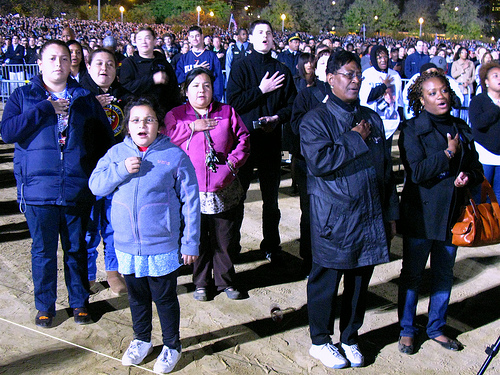We run our website the way we wished the whole internet worked: we provide high quality original content with no ads. We are funded solely by your direct support. Please consider supporting this project.

Should Christians Recite the Pledge of Allegiance?
A number of years ago I attended a basketball game at a Christian school. Just before the game everyone was asked to stand and say the Pledge of Allegiance. So I stood, placed my hand over my heart, and began to recite our national creed. Halfway through, however, I began to wonder what I was doing. I’m called to live as a foreigner in a strange land. I’m called to be a citizen of the Kingdom that is not of this world. I’m called to live as a soldier stationed in enemy occupied territory who has the job of carrying out the will of my enlisting officer. Yet here I was pledging allegiance not to Christ, but to the flag of a foreign land in which I happened to be stationed.
Early Christians were willing to be martyred rather than express allegiance to the Roman Empire, but here I was expressing allegiance to the American empire. This didn’t seem right. I stopped and haven’t said the Pledge since. I love America, but I cannot serve two masters. My allegiance must be pledged to Christ alone.
I acknowledge that people have different opinions about this matter. Some have told me they recite the Pledge to express support for the good things America stands for, not to express their ultimate allegiance to it. Others have told me they do it out of respect for those who have sacrificed their lives to defend our rights and freedoms, but again, not to pledge their ultimate allegiance. Others have told me they do it simply because they feel like a communist if they don’t. Fine. My concern isn’t with this particular American ritual.
What concerns me is that it doesn’t even occur to many American Christians that there might be a conflict between their allegiance to Christ and their Pledge of Allegiance to America. Their faith has become so nationalized that they assume these dual allegiances are compatible. This is an idolatrous assumption, and it helps explain why the lives of most American Christians are indistinguishable from the lives of their pagan American neighbors. We’re failing to revolt against the pagan values of our nation because the nation with its pagan values, has our allegiance—to the point that many followers of Jesus don’t even recognize the pagan values as pagan. They rather think the nation, with its values, is basically “Christian”!
It’s time for Kingdom people in America to be done with this. Our ultimate allegiance cannot be to America or any other country. It cannot be to a flag, democracy, the right to defend ourselves, the right to do what we want, the right to vote, or the right to pursue happiness however we see fit. We are Kingdom people only to the extent that God alone is King of our lives, and thus only to the extent that we revolt against the temptation to make any cultural values or ideas supreme.
—Adapted from Myth of a Christian Religion, pages 87-88.
Image by TheeErin via Flickr
Category: Q&A
Tags: America, Myth of a Christian Nation, Myth of a Christian Religion, Nationalism, Politics
Topics: Ethical, Cultural and Political Issues
Related Reading

Dear Greg: How Do You Handle Assumptions People Make About You When They Learn You Are a Christian?
Greg talks about demonstrating counter-examples in a world overflowing with assumptions and prejudices. http://traffic.libsyn.com/askgregboyd/Episode_0350.mp3

Why do you argue that discipleship and politics are rooted in opposite attitudes?
Question. At a recent conference I heard you argue against the idea that there could ever be a distinctly “Christian” political position by contending that political disputes are premised on a claim to superiority while discipleship is fundamentally rooted in humility. I don’t think I get what you mean. Can you explain this? Answer: In…

Kingdom Reconciliation is Not About Politics (But it is Political)
In the broader culture, the social and political discussions about racial reconciliation are usually focused on people’s rights and privileges as a means of making the world a fairer place. The criteria such efforts at reconciliation appeal to are common decency, fairness and reason. The enterprise is certainly necessary, and all decent, fair minded, rational…

Why is America Becoming More Politically Divided?
I watched a 20/20 special the other night on politics in America. The show explored the “growing political divide” in our country. Here’s some of the information found in this program. * Since the early 70’s Americans have become increasing polarized in their political views. Communities that once were pretty evenly split politically are now…

Lighten Up: Election Season Blues
It’s a little sad (but still pretty funny) that there are actual campaign posters similar to this one. The next time you get fed up or discouraged with all the over-the-top election ads, you might want to browse through these for a chuckle. And remember that our hope is not located in any election. Thank…

Podcast: Do You See a Difference Between Patriotism and Nationalism?
Greg separates the wheat from the chaff in this allegiance-busting politically provocative episode. http://traffic.libsyn.com/askgregboyd/Episode_0380.mp3
